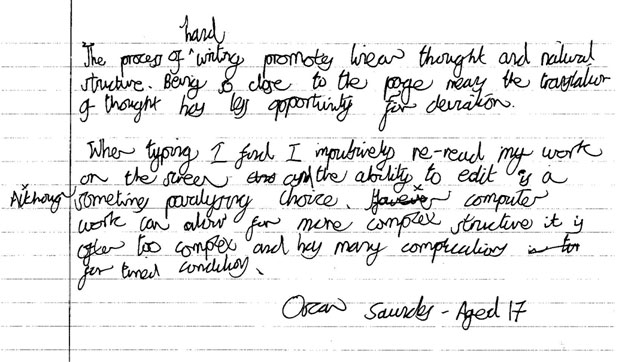In a world where toddlers learn how to use an iPad before they read their first book, it appears the craft of writing by hand is almost becoming obsolete. Most people write via keyboard - heck I am writing this article on my laptop right now.
But the question is, should schools, especially primary schools, bother to teach handwriting? Well, according to research in cognitive psychology and neuroscience, they should!
In this article, we take a look at how handwriting supports literacy and academic development in children.
Handwriting Helps With Reading
To teach children how to read, we must teach handwriting as early as nursery. Research by James & Englehardt in 2012 revealed that nursery children who learn to handwrite become more familiar with their alphabet early. Plus, it solidifies the neural pathways that underlie reading. It is apparent that both handwriting and reading share the same neural pathways in the human brain.
This is one reason why schools, in particular in the US, that have thrown out teaching handwriting should bring it back.
Related Learning: Level 3 Award in Education and Training RQFHandwriting can help with Spelling and Future Success
The more children write down different words by hand, they become familiar with how it is spelt. Research has shown that learning how to write by hand is a key aspect to improving spelling and writing composition. And, in addition to facilitating letter learning, further research has shown that handwriting can be a primary predictor for "later reading success”.
Also, handwriting introduces more fluency to the child's mind and allows developing complex composition for writing sentences that have meaning.
Handwriting Leads to Better Quality of Life
Learning to handwrite is much better than learning letters on a keyboard because learning how to write by hand nurtures adult-like visual systems in a child's developing brain. One study by Gimenez shared that a child who learns handwriting have a higher density and volume of grey matter which correlates to higher skills and ability.
Further research by Stevenson and Just show that older students who lack fluency in handwriting suffer low self-esteem, poor grades and lower quality of life.
Princeton University graduate student, Pam Mueller, conducted a well-known note-taking research found that writing on a laptop was less effective for remembering information. This conclusion led to Mueller championing the “Close Your Laptops” campaigns where she encouraged students to write notes in longhand.
Related Learning: Level 2 Certificate in Supporting Teaching and Learning in SchoolsHandwriting Enables Student to Express Themselves
Children who write quickly and legibly are likely to better express their words and thoughts via the written word. Plus handwriting can improve visual-motor skills like eye-hand coordination. Researchers have also found that developing fine motor skills during early stages of childhood can help children perform in mathematics.
Handwriting From a Personal View
Taken from the National Handwriting Association, Oscar, aged 17, who is studying A Levels had problems with writing legibly for a number of years. His college gave him permission to use a keyboard to write for his exams, here's what he had to say:

The process of handwriting promotes clear thought and natural structure. Being so close to the page means that translation of thought has less opportunity for deviation.
When typing I find I compulsively re-read my work on the screen and the ability to edit is sometimes paralysing. Although computer work can allow for more complex structure, it is often too complex and has many complications for timed conditions.
Oscar, Aged 17 years
Even Oscar finds handwriting better than typing on the keyboard. But then again, this is just one student's point of view
Why Schools Should Stick With Handwriting
While everyone will eventually do most of their writing on a keyboard in the near future, we should not throw away the craftsmanship of writing by hand. There's scientific evidence to show that it can help children improve their literacy and numeracy, and it even improves their memory. Plus, from a personal point-of-view, I find writing by hand more relaxing.
When I set out my day, I handwrite my to-do list in my notebook. I tried to type my to-do list on a tool like Evernote and Google Keep - not there is anything wrong with these tools - but it didn't help with my productivity. Plus, physically crossing off items on a paper-based to-do list feels so much more satisfying.
Thanks for reading. What are your thoughts on this topic? Please let us know in the comments section.



 Student Login
Student Login My Account
My Account